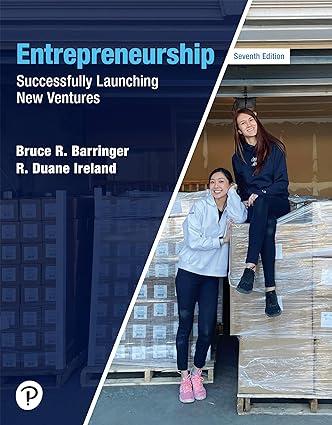Converting a business idea into a profitable company is challenging. Finding and using a mentor is one
Question:
Converting a business idea into a profitable company is challenging. Finding and using a mentor is one approach entrepreneurs can take to increase the probability of being able to convert an idea into an opportunity and, subsequently, a successful company. A mentor is a person with more experience than you have and who is willing to offer counsel and advice to you. Typically, mentors have experience in some facet of your market or business.
While there are many books and websites that offer advice about how to start a business, there is nothing like having an experienced person in your corner to answer questions, provide support, and help you over the rough spots.
So how does one go about finding a mentor and persuading the person to agree to a mentor/mentee relationship?
As we explain next, it is a three-step process.
First, consider your network of acquaintances—professors, business owners, coaches—to determine if there is someone you believe could help you. The number of people who are eager to share their expertise and develop a mentoring relationship often surprises first-time entrepreneurs. Second, if you are currently in college or are a college graduate, look for someone in your college or university’s alumni network.
Alumni often serve as judges for college-sponsored pitch or business plan competitions, so that is one way to connect.
Another way is via LinkedIn. In the LinkedIn search bar, you can type in the name of your university and then the functional title of the type of help you are seeking. For instance, if you are a student at Oklahoma State University and are looking for help raising money, you might type in CFO Oklahoma State University. The results will list everyone who has a LinkedIn Profile who identifies themselves as a CFO (chief financial officer) and is a graduate of Oklahoma State University. You can then connect with that person through the private email service within LinkedIn. Most people have fond memories of their college days and typically look forward to connecting with a student at their alma mater.
A third approach is to search through websites and magazine articles and attend networking events that might alert you to someone who could be a good fit. For example, 1 Million Cups is a networking event the Kauffman Foundation sponsors. There are weekly meetings in 121 cities across the United States. You can go to the 1 Million Cups website (www.1millioncups.com)
and find the location nearest you. Every Wednesday morning, one or two early-stage startups present their companies to a diverse audience of peers, educators, and advisors. It is a great place to make connections.....
Discussion Questions:
1. At this point in your educational process, your business (if you are starting one), and in your life in general, in what areas do you believe you could benefit the most from having a mentor? What would your expectations be for the mentor/mentee relationship?
2. Make a list of the opportunities on your campus and the surrounding community for connecting with potential mentors. Which opportunities do you think would be the best bet for you in terms of connecting with a potential mentor?
3. Go to LinkedIn and type in the name of your university and a functional area (marketing, finance, entrepreneurship, engineering, etc.) in which you have an interest.
How many search results did the query produce?
As you scanned the search results, did you notice anyone with whom you would like to connect?
4. To what degree do you believe having a mentor can make the difference between an entrepreneur succeeding or failing? Have you had a mentor at any point in your life? If so, briefly describe how your mentor helped you.
Step by Step Answer:

Entrepreneurship Successfully Launching New Ventures
ISBN: 9780138091828
7th Edition
Authors: Bruce R. Barringer, R Duane Ireland





